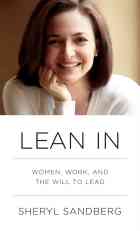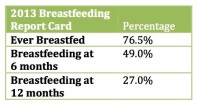The importance of human breast milk, often called “liquid gold,” has been noted for years. Countless scientific studies and government agency reports have cited the health benefits of breastfeeding, which include decreased risk of:
- Necrotizing enterocolitis
- Lower respiratory infections
- Asthma
- Obesity
- Type 2 diabetes
The American Academy of Pediatrics currently recommends exclusive breastfeeding for about the first six months of a baby’s life. The benefits of breastfeeding are clearly understood by mothers, as demonstrated by the 2013 Breastfeeding Report Card showing a high initiation rate. However, the significantly lower rate of mothers still breastfeeding at 6 months indicates that support is not being provided to mothers to allow continuation of exclusive breastfeeding.
 In the United States, the number of new mothers returning to work continues to rise. In her new book Lean In, Sheryl Sandberg, Chief Operating Officer of Facebook, notes the difficulties of being a working mother in a high-demand position and recalls being forced to find time during the day to pump, often as she was on conference calls. However, most mothers are not as fortunate as a Silicon Valley executive. They often return to lower-level positions at companies without pro-breastfeeding workplace policies, or more importantly the ability to implement such policies.
In the United States, the number of new mothers returning to work continues to rise. In her new book Lean In, Sheryl Sandberg, Chief Operating Officer of Facebook, notes the difficulties of being a working mother in a high-demand position and recalls being forced to find time during the day to pump, often as she was on conference calls. However, most mothers are not as fortunate as a Silicon Valley executive. They often return to lower-level positions at companies without pro-breastfeeding workplace policies, or more importantly the ability to implement such policies.
This lack of support is frequently not malicious, but rather demonstrative of managers who do not understand the the potential cost savings in employee retention and reduction of sick time taken by parents for children’s illnesses. Programs, such as the Business Case for Breastfeeding through the U.S. Department of Health and Human Services, should be more widely utilized as they provide mothers and their supports with the information necessary to implement pro-breastfeeding workplace policies and potentially increase the percentage of mothers providing their baby with this nutritional and neurodevelopmental advantage.
Tags: breastfeeding, Business Case for Breastfeeding, Lean In, Pediatrics, Public Health

August 19, 2013 at 11:29 am |
This is an important issue. I know many moms who face issues getting time to pump while at work. Employers/managers need to be educated on the laws and the benefits for all when they support breastfeeding moms in the workplace. The overall health benefits are clear for mom and baby and also the general economic benefits for society as a whole. HR departments could take the lead in educating staff of this.
August 19, 2013 at 4:52 pm |
I also agree this is a very important issue. The role of the workplace in setting pro-breastfeeding workplace policies like special rooms where women can pump and regular breaks, is very important. However, we should also consider the role of the media. We constantly hear stories on the media of confrontations in public places (restaurants, planes, etc) – these negative cultural attitudes towards breastfeeding discourage women from breastfeeding. Maybe a social media campaign should be implemented painting breastfeeding in a positive light and something natural that should not offend others – and maybe more people would come to accept it.
August 22, 2013 at 6:27 pm |
While I do not have a child, I do appreciate that my workplace has taken measures to facilitate and promote taking care of the child onsite, including breast-feeding. We have a mother’s room in the office.
August 24, 2013 at 10:43 am |
Being a mother of a 3 year old I have relatively recent personal experience with this issue. I was extremely motivated to breastfeed for a minimum of 12 months, and had the luxury of staying home with my son. Yet at every turn I felt the greatest challenge to successful breastfeeding came from health care providers. Upon my hospital discharge I was given a packet that included formula, but not a single resource for breastfeeding support (including home visiting lactation consultants, la leche league meetings, etc). When I experienced challenges I was on my own to research resources available in my community. The frequent pediatrician visits that occurred mirrored this. Formula is freely given but information regarding breastfeeding isn’t. Subsequently I returned to work before I ceased breastfeeding and the hospital I worked at required that I clock out to pump (while smokers didn’t).
While it is important to encourage employers to provide the facilities for nursing mothers; as health care providers we also need to evaluate how supportive our own actions are of the recommendations we give our patients.
August 25, 2013 at 12:24 am |
Thank you for posting this, as this topic really rings home with me at this time! I am 9 months pregnant and I have actually been overwhelmed with breastfeeding information- both from my family doctor and pre-natal group. I will be expecting a visit from a public health nurse after I am discharged from our hospital and I have been warned from new Mom’s of the aggressive attitude towards breast feeding. Many new Mom’s telling me of significant emotional stress if they are having issues with breastfeeding- as they are often left with a feeling of failure or of being an “unfit” mother. I think with all public health interventions, we do need to be careful to not go too far the other way in specific health behaviour promotion, as it could lead to the opposite result.
August 25, 2013 at 12:31 am |
Thank you for posting a very important topic. I think providing appropriate accommodations and support for women breastfeeding is a valuable public health measure. The research is extensive on the benefits of starting a child on mother’s milk. And gratefully it made it into the Affordable Care Act as Section 4207.
“Section 4207… requires employers to provide reasonable break time and a private, non-bathroom place for nursing mothers to express breast milk during the workday, for one year after the child’s birth.”
http://www.usbreastfeeding.org/Workplace/WorkplaceSupport/WorkplaceSupportinHealthCareReform/tabid/175/Default.aspx
I am grateful to witness appropriate action taken in my workplace:
Einstein Healthcare Network has been recognized as a breastfeeding friendly employer by the City of Philadelphia, together with the Maternal, Child and Family Division of the Philadelphia Department of Public Health, and Maternity Care Coalition. Einstein was one of 12 Philadelphia employers recognized during World Breastfeeding Week for taking steps to support mothers and become officially certified breastfeeding friendly workplaces.
“Breastfeeding gives babies the healthiest start to life since breast milk contains vitamins and nutrients that help protect babies from illnesses, so we’re happy to offer these comfortable breastfeeding lounges to our employees,” said Janine Wright, Human Resources Specialist at Einstein Healthcare Network.
In the building that I work, there are 2 lounges. Additionally, they come equipped with hospital grade breast pumps in case mothers don’t have their own. Mothers may reserve the room by contacting nurse managers from the Women’s and Children’s unit. Their contact information is provided on our employee health and wellness website. A lactation consultant’s information is also provided for any questions.
Let’s hope more women get to experience this in their workplace along with education about nursing.
August 26, 2013 at 4:56 pm |
I concur with the wonderful insight of this blog post as well as the comments posted. There is a wealth of research that highlights the benefits of breastfeeding, including forming a bond with the child, proper immune system development, neurophysiological development, and overall health and well-being. The United Nations Millennium Development Goal #4 is to reduce childhood mortality, and for many countries breastfeeding is an important aspect of attaining this goal. Many developing countries perform breastfeeding more frequently than individuals in the United States. While child mortality is not high in the United States, there is overwhelming evidence that indicates an infant’s overall health condition would be better adequate breastfeeding. On the contrary, in the United States is excellent at promoting formula use…a practice that is essentially fast food for the infant. There is a parallel, as many people know that whole foods and vegetables provide more health benefits than fast food. However, they often prefer the taste and convenience of the fast food in lieu of the long-term health benefits of the whole foods and vegetables. Mothers must consider, though, that their action is not for their personal future, but for the future health and well-being of their child.
Pediatricians hold the greatest potential to influence parents on the nutritional recommendations for their children. The American Academy of Pediatrics Breastfeeding Guidelines recommends “exclusive breastfeeding for about the first six months of a baby’s life, followed by breastfeeding in combination with the introduction of complementary foods until at least 12 months of age, and continuation of breastfeeding for as long as mutually desired by mother and baby.” Therefore, pediatricians should have counseling parents on these recommendations every time they offer the formula to parents. I believe it would be useful and valuable for the government (FDA, and others) to mandate that each package or bottle of formula include the American Academy of Pediatrics’ breastfeeding guideline to ensure that parents are well informed of this national recommendation, so they can thus make the most educated decision based upon their personal, financial, occupational, and time-available circumstances.
With the technology and resources of our country, it would also be a beneficial for a company to design a “stealth breast pumping device” that can be worn at work that pumps throughout the day undetected! This would empower women with tremendous freedom and liberty to pump often and easily, and not be required to take personal time to pump or to be forced to use formula if not provided an easy opportunity to pump at work.